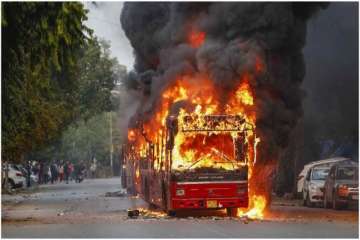Aruna Jain, the President of the New Friends Colony Residents Welfare Association (RWA), vividly remembers the evening of Sunday, when the residents of her neighbourhood were left at the mercy of god as some miscreants from a protest nearby tried to break open the main colony gate.
“Delhi Police was nowhere to be seen. We could see the billowing smoke from our homes, which we later came to know was from a bus torched by the protestors,” she recalls. “The police spurred into action a bit too late. They could have prevented the violence,” she adds.
As the protests against the Citizenship Amendment Act rock the national capital, the lives of residents who have called Delhi home for decades have been thrown out of gear.
And they blame the protestors for this. “There are more legal ways available to register your protest. They have to be considerate towards others as well. We are part of the same democracy,” she said.
Jain, who lives next door to the Jamia Milia Islamia University, the epicentre of ongoing protests in the Capital, believes that most of those protesting the Act are paid up by political parties.
“Most of them are protesting because they have been asked to. They wouldn’t even know why they are protesting,” she says.
A few kilometres from Jain’s neighbourhood lies Greater Kailash Part 2, one of South Delhi’s posher neighbourhoods. The vice-president of the GK-2 RWA, Deepak Jhaveri, is critical of the citizenship Act protestors as well, who he says have caused disruptions throughout the city.
“There might have been some grievances but vandalising property is not acceptable,” says Jhaveri.
Anil Bajpai, the President of RWAs Federation of East Delhi, believes that the protestors don’t enjoy the support of Delhi locals, adding that most of them are persons with vested political interests.
“This is no way to lodge a protest. Not only the office-goers, even ambulance and other basic services have been affected,” he says.
“Who is going to take responsibility for all this,” he questions.
Delhi’s eastern part has for the last few days witnessed a tense showdown between the protestors and the police, after a protest march against the Act in Jafrabad turned violent.
Several buses were torched in the ensuing violence, leading to the imposition of Section 144 in the affected locality.
Thousands of protestors, mostly comprising students, political activists and locals from several neighbourhoods, took to streets in the Capital to vent their ire against the new legislation. The authorities snapped the internet and telephone services in many parts of the city in a bid to stem the protests. Opposition leaders and scores of activists, including CPI’s D Raja and Yogendra Yadav among others, were taken into preventive custody.
Similar protests were witnessed in other major urban centres of the country, including Bengaluru, Kolkata, Mumbai and Lucknow among others.
Latest India News
